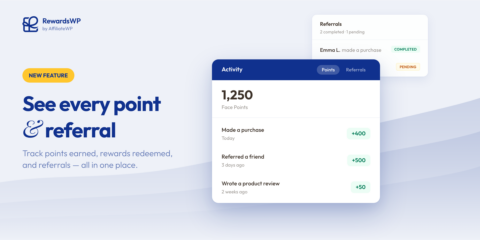
Your Customers Have Points. Now They Have Proof.
Rewards Activity gives your customers a full points history and real-time referral tracking, right inside the rewards widget. Available on all RewardsWP plans.
Continue Reading →
Rewards Activity gives your customers a full points history and real-time referral tracking, right inside the rewards widget. Available on all RewardsWP plans.
Continue Reading →
Want to set your affiliate marketing cookie duration?
Cookies are an essential part of affiliate marketing, and you need to have control over how long they last.
So, we’re going to show you exactly how to manage your affiliate cookie duration in WordPress.
Cookie duration in affiliate marketing is the time window you give affiliates to earn a commission after someone clicks their link. When someone clicks an affiliate link, a small text file (called a cookie) gets stored on their device. This cookie contains the affiliate’s ID, letting your system know which affiliate should get credit for the sale.
For example, let’s say you set a 30-day cookie duration. If someone clicks your affiliate’s link today but comes back and buys two weeks later, that affiliate still gets the commission. This tracking works even if the customer doesn’t click the affiliate’s link again when making the purchase.
However, there are some important things that can affect cookie tracking. The system only works if the customer makes the purchase on the same device they originally clicked the link on.
If they click on their phone but buy on their laptop, the affiliate won’t get credit.
The cookie also needs to be accepted by the customer’s browser, and it won’t work if they’ve cleared their cookies or clicked another affiliate’s link for your product.
While 30-day cookie duration is most common, it’s not necessarily the best. Some programs offer lifetime cookies that never expire unless manually cleared.
However, these are rare because companies often pay commissions higher than their product margins, balancing it with revenue from purchases made outside the cookie window.
Most affiliate programs set durations between 1-30 days. The right duration for your program depends on your business model. Consider that sales rarely happen on the first visit – customers often need time to think before purchasing. That’s why most affiliates look for programs offering at least 15-30 days.
| Cookie Duration | Pros | Cons |
|---|---|---|
| Short (e.g., 7 days) | – Encourages immediate action – Less risk of commission loss | – May miss delayed purchases – Less attractive to affiliates |
| Medium (e.g., 30 days) | – Balances immediate and delayed purchases – Common standard | – Some sales might be missed – Higher risk if customer delays |
| Long (e.g., 90 days) | – Captures more sales from slow decisions – Attractive to affiliates | – Higher risk of commission loss – May be inefficient for merchants |
Also consider your remarketing efforts. If you invest heavily in retargeting campaigns, a shorter cookie duration might make more sense financially.
Ultimately, choose a duration that balances attracting quality affiliates with your business needs and profit margins.
Ok, so really, you can set your affiliate cookie duration in 2 steps, but we’ve got some extra little tips that are going to make your cookie policy more effective.
Let’s take a look at how you can set your affiliate cookies in WordPress.
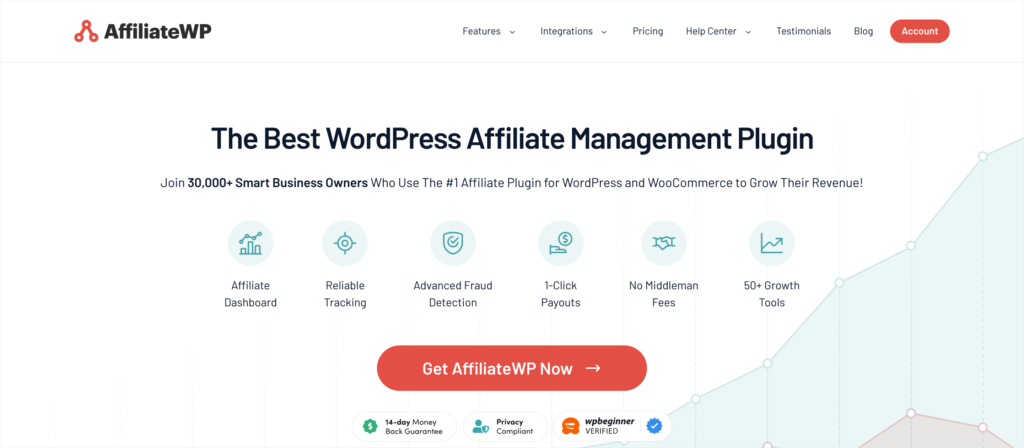
AffiliateWP is the best WordPress affiliate management plugin and it’s going to give you complete control over your affiliate cookies.
Before you start tracking affiliate links, you’ve got to have the right software in place, and if your website runs on WordPress, that software is AffiliateWP. It’s going to allow you to set up your affiliate program in under 10 minutes, and it’s also got some incredibly powerful affiliate management tools.
Just head to the pricing page and choose the plan that best fits your needs.
Once you’ve completed your purchase, you’ll be able to integrate your affiliate program with a whole host of applications in just a click by opening the setup wizard:
This will give you the perfect platform to grow your business through affiliate marketing, and the powerful growth tools will allow you to attract the very best affiliates.
To edit your affiliate marketing cookie duration, all you have to do is open the AffiliateWP Settings page from your WordPress admin.
Now, head to the Commissions tab and scroll down until you see the Cookie Expiration box.
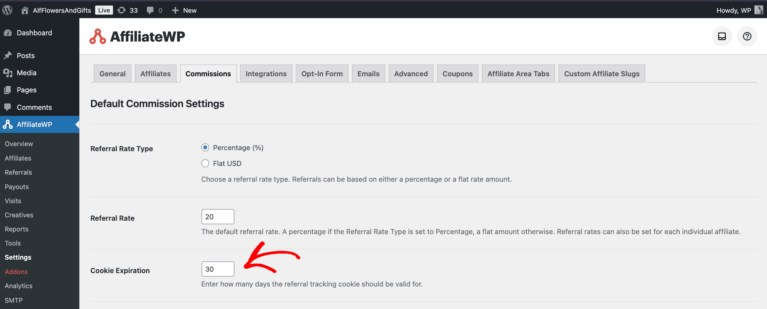
Simply enter the number of days you would like your cookies to last and then click Save Changes at the bottom of the page.
That’s it, you’ve now set your affiliate cookie duration.
Along with affiliate commissions, your cookie policy is one of the key details potential affiliates are going to be interested in.
The longer your cookies last, the easier it is for an affiliate to make a sale, so they’re going to be looking for clarity on this issue.
It’s important you make this information readily available on your affiliate signup page and on your terms of use page. Your affiliate terms of use detail all the important information affiliates need to know, so it’s the perfect place to outline your cookie policy.
You can effortlessly add an affiliate terms of use to your program using AffiliateWP’s Terms of Use Generator.
Just go to the AffiliateWP Tools page and click on the Terms of Use Generator tab. This will bring up a draft terms of use where you can automatically add in your company details.
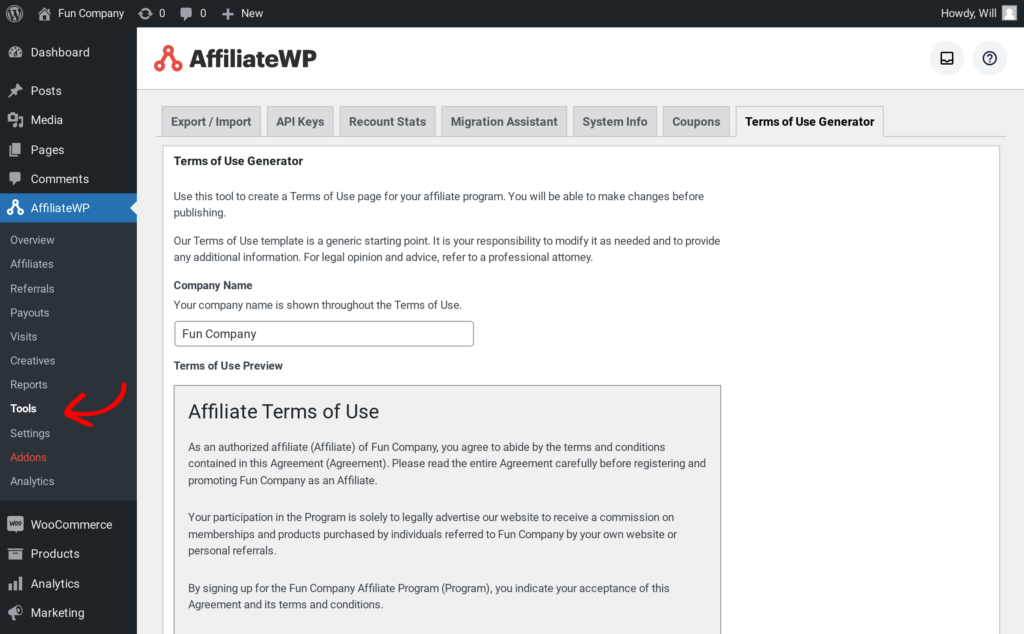
When you click Create Terms of Use Page, a new WordPress page will be drafted, ready for you to edit. Once you’ve decided on your cookie policy, you can then manually add a section that highlights your cookie expiration.
An Affiliate Area page will be created as soon as you complete the AffiliateWP setup wizard, and potential affiliates can use this page to sign up for your affiliate program.
To edit the Affiliate Area page, simply go to Pages, and search for Affiliate Area. You can use the blocks to edit your affiliate registration form and make sure you’re collecting all the information you need.
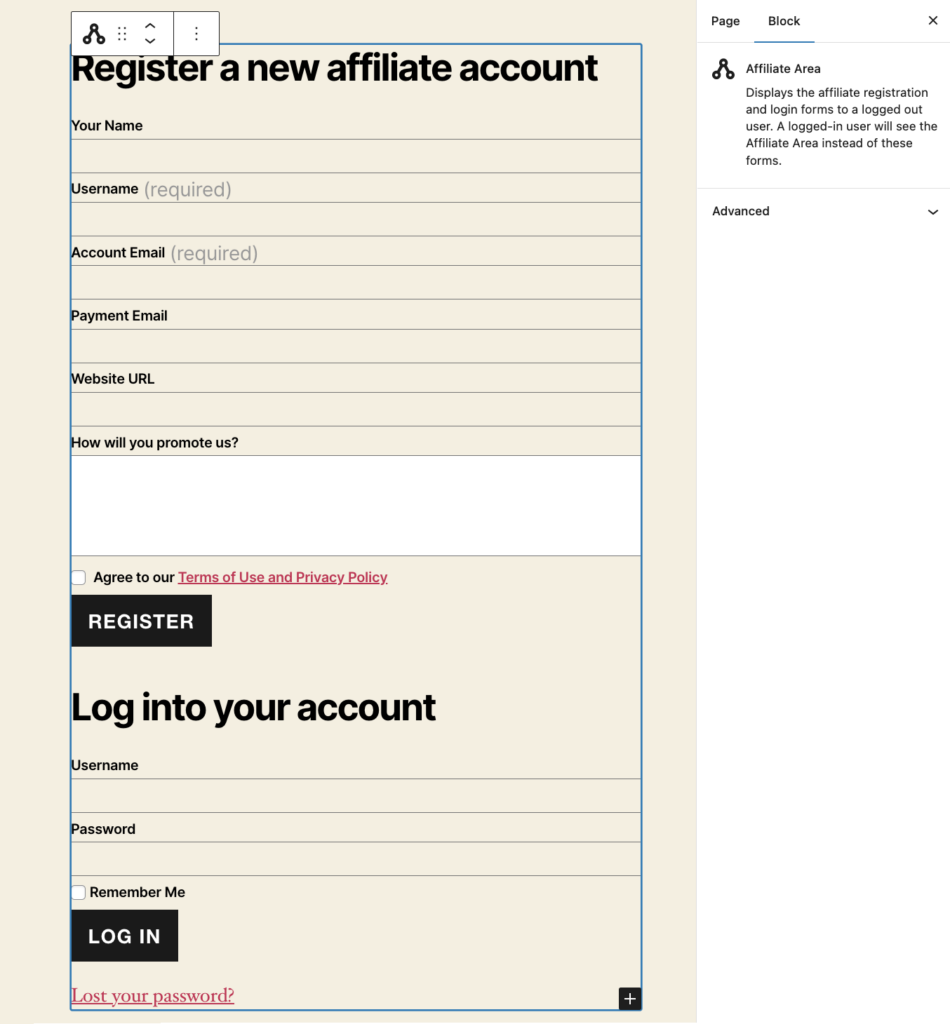
As soon as the affiliate has signed up and been approved, this page will then turn into their log-in area and affiliate dashboard.
Once again, there’s a lot you can do to customize this page, so make sure to build it in your brand’s image and add relevant information using Affiliate Area Tabs.
Let’s start with a question we commonly get asked, “does affiliate marketing use third-party cookies?”
The answer is no. When you’re using quality link tracking software like AffiliateWP, it relies on 1st party cookies as opposed to 3rd party cookies. So, what’s the difference?
3rd party cookies are cookies that are added to your browser by websites other than the one you are currently on. For instance, you might be reading your favorite blog, and a 3rd party cookie from an advertising agency is added to your browser.
This 3rd party cookie is used to track your behavior across different websites so the advertising agency can provide you with tailored display ads.
These 3rd party cookies are being clamped down on and are routinely interrupted by privacy updates from major companies like Apple. This means that they would be very unreliable for use in affiliate link tracking.
Instead, affiliate marketing uses first-party cookies, which are cookies that are added to your browser by the website you’re visiting. They’re used to track your journey between the pages on the website normally for analytics purposes or to remember cookie preferences, or save a shopping cart.
These 1st party cookies don’t represent the same affront to people’s privacy, and they’re much more reliable, making them ideal for affiliate link tracking.
So, in summary, yes, big changes are being made to cookies, but it’s 3rd party cookies that are the target. 1st party cookies are still an essential part of how the internet works, and these are the cookies that form the basis of affiliate link tracking.
An affiliate cookie lasts as long as the affiliate program manager decides it should last. Most commonly this tends to be between 1 and 30 days, although there is no limit to how long an affiliate cookie can last.
Affiliate links work by adding a cookie to people’s browsers when they click the link. Affiliate software can then recognize the cookie in a person’s browser when they land on the merchant’s site and make a purchase. The affiliate software can then facilitate a commission payment to the successful affiliate.
Changes to cookies are generally focused on 3rd party cookies which aren’t an important factor in affiliate marketing. Instead, affiliate marketing uses 1st party cookies which are much more reliable and allow for accurate affiliate tracking.
Not really—30 days is a popular choice because it balances merchant costs and affiliate appeal, but it varies. Short-term products (like event tickets) might use 7 days, while big-ticket items (like software subscriptions) might go for 60 or 90 days. It’s all about matching your sales cycle.
Not always. A longer duration—like 90 days—can capture more sales from slow deciders, but it might also credit affiliates for purchases they didn’t heavily influence. A shorter window, like 7 days, keeps commissions tied to direct efforts but might miss delayed buyers. Test and tweak to find your sweet spot!
Communication is key! After setting your duration in AffiliateWP, share it in your affiliate program terms, welcome emails, or a quick dashboard note. Transparency builds trust—affiliates love knowing a 30-day cookie gives them a fair shot at commissions.
Now that you know everything there is to know about affiliate marketing cookies, it’s time to set up your own affiliate program.
It’s incredibly easy to get started, and, since you only pay affiliates when they make a sale, it’s very low risk.
Want more resources to help you get started? We’ve got you sorted!
Now there’s only one thing left to do.
Disclosure: Our content is reader-supported. This means if you click on some of our links, then we may earn a commission. We only recommend products that we believe will add value to our readers.
Launch your affiliate program today and unlock a new revenue channel to grow your business faster.
We use cookies to improve your experience on our site. By using our site, you consent to cookies.
Manage your cookie preferences below:
Essential cookies enable basic functions and are necessary for the proper function of the website.
Statistics cookies collect information anonymously. This information helps us understand how visitors use our website.
Marketing cookies are used to follow visitors to websites. The intention is to show ads that are relevant and engaging to the individual user.